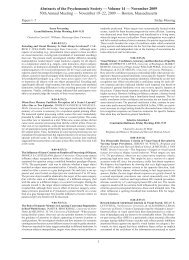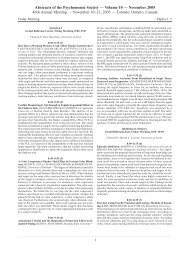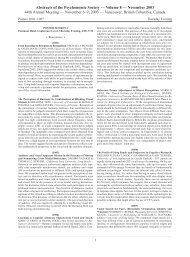S1 (FriAM 1-65) - The Psychonomic Society
S1 (FriAM 1-65) - The Psychonomic Society
S1 (FriAM 1-65) - The Psychonomic Society
Create successful ePaper yourself
Turn your PDF publications into a flip-book with our unique Google optimized e-Paper software.
Papers 237–243 Saturday Afternoon<br />
lowing work on the development of these capacities in humans, investigators<br />
have recently begun to study metacognition in nonhuman<br />
species, particularly monkeys. I will briefly summarize these findings<br />
from nonhumans and highlight some methodological issues critical in<br />
the study of metacognition in nonverbal subjects. Consideration of<br />
these issues prompts some re-evaluation of the diversity of metacognitive<br />
phenomena in humans.<br />
5:10–5:25 (237)<br />
Tapping Into Tool Use. DOROTHY M. FRAGASZY, University of<br />
Georgia—Monkeys and apes, like humans, may use tools to extend<br />
the reach of the hand and to afford mechanical advantage, as in using<br />
a hammer, a rake, or a probe. <strong>The</strong>se achievements arise through similar<br />
developmental trajectories across species, until tool use blossoms<br />
in young humans during early childhood to include forms not seen in<br />
other primates. I describe tool use in terms of spatial relational reasoning,<br />
and discuss the spontaneous development and variations of<br />
tool use in monkeys, apes, and humans in natural settings from this<br />
perspective. This exercise highlights evolutionary and developmental<br />
continuities in this domain, and clarifies in what sense tool use in humans<br />
differs from that of other primates.<br />
Memory Processes<br />
Beacon A, Saturday Afternoon, 3:10–5:30<br />
Chaired by Colin M. MacLeod, University of Waterloo<br />
3:10–3:25 (238)<br />
<strong>The</strong> Production Effect: Improving Explicit but Not Implicit Memory.<br />
COLIN M. MACLEOD, NIGEL GOPIE, KATHLEEN L. HOURIHAN,<br />
& KAREN R. NEARY, University of Waterloo—A series of experiments<br />
investigated the production effect—that speaking or “mouthing” a<br />
word during study improves explicit memory, relative to reading a<br />
word silently. <strong>The</strong> effect is restricted to within-subjects designs where<br />
only some individual words are produced. It is not evident when a single<br />
repeated manual or vocal response is made to some words. We<br />
argue that producing a subset of studied words makes those words distinctive,<br />
and that distinctiveness is useful for discriminating studied<br />
from unstudied words at the time of test. Production is consistently<br />
beneficial in explicit memory, even incrementing the generation effect.<br />
Yet production consistently failed to benefit the implicit memory<br />
test—speeded reading aloud—that would appear to be optimally<br />
transfer appropriate. This is also consistent with the distinctiveness<br />
account: Distinctiveness is relevant only for conscious recollection.<br />
<strong>The</strong> production effect represents a simple but powerful mechanism for<br />
improving explicit memory for selected information.<br />
3:30–3:45 (239)<br />
Reconsolidation of Episodic Memories: <strong>The</strong> Conditions That Trigger<br />
Updating. REBECCA GOMEZ & ALMUT HUPBACH, University<br />
of Arizona, OLLI HARDT, McGill University, & LYNN NADEL,<br />
University of Arizona—Consolidated memories re-enter a labile state<br />
at the time they are reactivated. During this time, memories can be<br />
modified and subsequently require reconsolidation. We recently<br />
demonstrated reconsolidation effects in human episodic memory:<br />
Memory for a list of objects was modified by the presentation of a new<br />
list, if and only if participants were reminded of the first learning<br />
episode before learning the new list. <strong>The</strong> reminder was comprised of<br />
three different components: the experimenter, a reminder question, and<br />
the spatial context. We have now evaluated the contribution of each of<br />
those reminder components, and showed that the spatial context carries<br />
the reminder effect. An additional study looked at the boundary<br />
conditions for contextual reminders. We found that the spatial context<br />
triggers reconsolidation only in unfamiliar but not in familiar contexts.<br />
3:50–4:05 (240)<br />
Encoding During Retrieval: Effects in Recognition but Not in Free<br />
Recall. MARTIN BUSCHKUEHL, SUSANNE M. JAEGGI, HELEN<br />
37<br />
WYLER, & WALTER J. PERRIG, University of Bern—Previous research<br />
(Buckner et al., 2001) showed that the encoding effect of recognition<br />
judgments on new words in a following unexpected second<br />
recognition task was the same as in conditions of deep encoding and<br />
intentional learning. We extended the used experimental design in<br />
adding a free recall task to the unexpected recognition task in order<br />
to test the hypothesis that the performance in free recall is better in<br />
the intentional condition compared to the incidental ones. As expected,<br />
we could replicate the effects by Buckner et al. for the recognition<br />
data, but surprisingly, we found no differences at all in the free<br />
recall, regardless of the encoding condition. We assume that although<br />
we could establish an episodic memory representation accessible in<br />
data driven retrieval in the recognition performance, this representation<br />
was not deep enough to show up in the self-initiated free recall,<br />
producing a phenomenon of amnesia in healthy subjects.<br />
4:10–4:25 (241)<br />
<strong>The</strong> Influence of Prior Knowledge in an Analog Recall Task.<br />
MARK STEYVERS & PERNILLE HEMMER, University of California,<br />
Irvine—Our memory for events can be shaped by prior knowledge<br />
for those events, an influence that is often regarded as a source<br />
of bias leading to inaccurate reconstructions of actual events. However,<br />
a Bayesian analysis of reconstructive memory suggests that prior<br />
knowledge should be utilized when our episodic memory system is<br />
noisy. With an analog recall memory task involving natural objects,<br />
we show how the remembered sizes of objects regress toward the prior<br />
mean size for those objects. For example, a larger than average apple<br />
shown at study tends to be remembered as a somewhat smaller apple<br />
at test. Using a Bayesian approach, we estimate the relative contributions<br />
of prior knowledge and episodic traces in reconstructive memory.<br />
In accordance with the model, we find that the prior exerts the<br />
strongest influence when the participants has not seen the object very<br />
often or is uncertain about recognizing the object.<br />
4:30–4:45 (242)<br />
Remembering to Do Things for Others: When Incentives Hurt.<br />
MARIA A. BRANDIMONTE, Suor Orsola Benincasa University,<br />
DONATELLA FERRANTE, University of Trieste, CARMELA<br />
BIANCO, Suor Orsola Benincasa University, & MARIA G. VILLANI,<br />
Parthenope University—Memory for intentions, or prospective memory,<br />
often involves remembering to do things for others rather than for<br />
oneself. Yet, virtually nothing is known about prosocial prospective<br />
memory. In two experiments, we explored the effects of different<br />
types of rewards on prosocial prospective remembering. Across the<br />
experiments, participants received material and/or nonmaterial rewards<br />
for their prosocial prospective behavior. <strong>The</strong> results revealed<br />
that prospective memory was better when the participant’s action had<br />
a social relevance as compared to a standard nonsocial condition.<br />
<strong>The</strong>y also showed that prosocial prospective memory was equally<br />
good under high- and no-incentive conditions. However, consistent<br />
with social and economic theories of altruism, when a small explicit<br />
incentive was introduced, it crowded out intrinsic motivation, hence<br />
reducing prosocial remembering. <strong>The</strong>se effects emerged with both<br />
material and nonmaterial rewards. <strong>The</strong>se results shed new light on the<br />
relationship among cognitive, social, and motivational mechanisms<br />
underlying memory for intentions.<br />
4:50–5:05 (243)<br />
When Emotional Expectations Fail to Become Reality, Memory<br />
Suffers. MARA MATHER & MARISA KNIGHT, University of California,<br />
Santa Cruz—Neutral stimuli that previously preceded aversive<br />
events elicit emotional reactions when encountered again. However,<br />
presentation of the emotional harbinger alone, without the emotional<br />
outcome, eventually leads to the extinction of the aversive reaction.<br />
Although much research has focused on extinction of conditioned behaviors,<br />
little is known about the impact of expectation and outcome<br />
on explicit memory. Our findings reveal amnesia for events that involve<br />
unfulfilled emotional expectations (both negative and positive).





